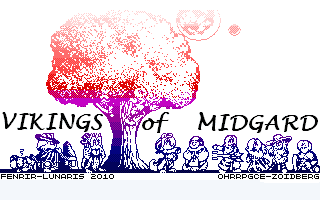Vikings of Midgard is the well-known
flagship game for the OHR, and although it has been complete for some
time, I had never played it until this point. The version I am
reveiwing is the version released for the Heart of the OHR
contest. This version presents us with a basically enjoyable game
that unfortunately makes good on its Readme's claim to be a "bug-ridden
mess".
Let me say something right away. Although the Readme gives fair
warning about this, I still feel that, in the representative game that
is included with the engine, mistakes like this shouldn't exist:
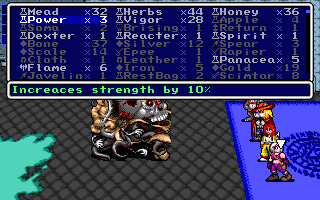
Really???
This is not an isolated issue. Over and over throughout the game,
spelling and grammar errors appear; I tried to keep track of them all
for awhile, but gave up after the fifth hour of gameplay or so.
There are even several game-breaking bugs that crop up. Some of
these might not be the game's fault (jumping enemies getting stuck
offscreen is, I believe, an engine bug), but for a game meant to
display the engine's capabilities, it seems embarassing to me to have
so many bugs. Even the Readme has mistakes. Why?
Okay, enough of that. I brought that up first because I actually
don't think it's fair to judge Vikings against other HotOHR contest
games while holding it to a different standard as the engine's
representative game, and I plan on ignoring this fact in the remainder
of the review. So let's move on.
To begin with, the graphics in Vikings of Midgard are wonderful.
Everything is colorful and detailed, and unlike the rather small
sampling of graphics in Viridia, here we are given enough to fully
appreciate Fenrir's mastery over a wide variety of visuals. The
diverse landscapes and backgrounds are beautiful, and yet are outdone
by the incredible variety of enemies of all shapes and sizes (and
facial expressions - some of these are amazing and made me
laugh). The music and sound, while not excellent per se,
certainly do their job, and the only complaint I could make about the
aesthetics in this game is one about the OHR generally: sound effect
volumes are rediculous. Some fit well (the wind blowing in
Niffleheim deserves to be loud), but others are really distracting
(lots of enemy death-sounds).
The story in Vikings is, unfortunately, nowhere near as consistent as
the graphical quality. Early on the tale is lighthearted and
silly. After a bit of background in the intro, Odin simply tells
you where to go, and to get on with it. The early quests seem
only vaguely related to the idea of saving Freya, but it doesn't really
matter. Similarly, characters join the quest for next to no real
reason, and learn skills along the way from various NPCs for absolutely
no reason at all. At first it's all seems kind of funny and
tongue-in-cheek, but after a couple hours the jokes and lack of a real
driving plot start to wear thin.
However, about half way through the game or so, the tone really
changes. The Einherjar go from being goofy anti-heroes to serious
nemeses. Some of the heroes are suddenly revealed to have
backstories, revealed in full cutscenes that end in learning new
skills. Although I was glad to have more of a plot and a world to
sink my teeth into, I found this sudden change pretty jarring.
It's almost as if we have two different writers in the first and second
halves of the game. Compound this with the various grammar
mistakes and the general lack of clarity (I'm still not certain what
the Einherjar were trying to do in the first half of the game, or if
there was some actual purpose to the Dark One kidnapping Freya beyond
just being a jerk), and we have a story that lacks any feeling of
internal cohesion or consistency. Luckily, this rarely prevents
the player from progressing through the game.
As one final point here, there are many OHR community-based jokes
throughout the game - perhaps this is the most consistent aspect to the
'story'. As someone who is fairly familiar with the community but
hasn't actually ever seen Smokey Magoo online, or played Sheep Rancher,
I can say that these references are only occasionally
distracting. If I hadn't known who ChaosNyte was, this textbox
would have really confused me:
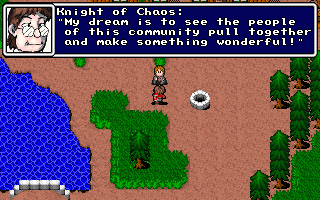
Hm, someone who likes chaos wants to see people pull together... wha?
The real downside to this was that there were a few times that I pretty
much ignored some NPCs' comments because I wasn't sure if they were
simply referencing something from the community that I didn't
know. There were also a few plot-holes that seemed like they
might revolve around some kind of community reference (Freki's mom is a
snake because her family used to be shapeshifters, but aren't
anymore...?). The good news is that none of this is consequential
at all, and I was able to beat the game without troubling myself over
any of this, which is certainly the best way to include such references.
As for the gameplay of Vikings, there was a lot to like. Most
random battles are fairly quick, and levelling up does not take very
long, nor is it usually necessary. The game is pretty well
balanced early on, tending towards the easy side, but still requiring
some care to survive some of the boss battles. The various heroes
all have their own uses, although some seem clearly worse than the
others (I never found any real use for either Hilda or Olaf, for
example). There are lots of weird quirks within the battles, but
they're not always good. Having a random ally help you for some
battles works alright, but makes absolutely no sense. On the
other hand, needing to use an elemental attack to kill zombies is an
interesting mechanic, but totally negates the use of Frumpy's Force
attacks which weren't assigned an element, despite only working on
zombies (oops). It also leads to scenarios where it might be
impossible to win some battles, although the player can still run
away. On the whole though, battles are pretty fun in Midgard.
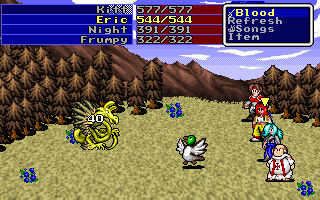
Umm...
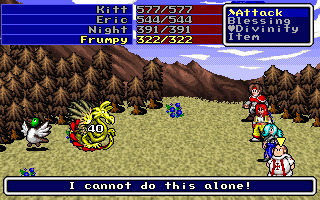
Okay, so I have to help a random duck fight random monsters?
That's ... interesting.
Unfortunately, as the game goes on, the balance becomes more and more
inconsistent. There came a point where, after beating a
satisfyingly difficult boss, I found myself in areas where random
enemies were killing my heroes in one hit. But then towards the
end of the game, with the ability to increase my allies' speed AND put
them in an uncapped state of regenerating HP, I was pretty much
invincible and even the final boss, once I was set up, was killed by
holding down the space bar.
Gameplay outside of battles is alright. There are a few simple
but interesting puzzles such as using the weather control in Niffleheim
to hit both switches necessary to continue. But some of the
puzzles don't work so well. Finding the necessary hidden passages
in some areas would have been the most tedious thing ever without
Styrge's ability to see them, which makes these hardly 'puzzles' at
all. And I still have no idea how I managed to clear out the
boxes in Vile Castle.
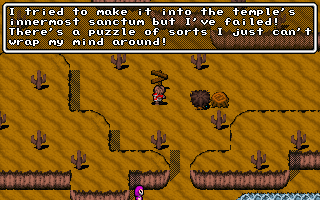
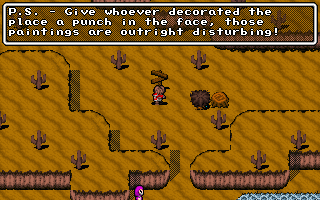
Yup, this is exactly how I feel too.
Where does all this leave us? Vikings of Midgard is a
classic-style RPG with gorgeous graphics and simple but mostly fun
battles. It is complete, at least in the sense that the game can
be beaten (great ending, by the way!). Nevertheless, the game has
more than its fair share of problems. Spelling and grammar aside,
there are a great many bugs (wallmaps, battles, scripts), some of which
are game-breaking, spread throughout. There are also occasional
balancing problems, although not usually very severe. The story
is a bit unclear, and has a noticable change in style about halfway
through the game.
That might seem like a long list of flaws, but I can say without
reservation that none of those flaws encompass the game as a whole, and
every one of them could be ironed out, most of them easily (as opposed
to the general graphic and story problems in Hero, or my gripes with
the central gameplay mechanics of Viridia and Do You Want To Be A
Hero?). And so to any player willing to turn a blind eye to the
'technical issues', Vikings of Midgard is well worth a playthrough.
